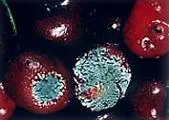 Sweet cherry (Prunus avium L.) is highly susceptible to pathogenic infections causing decay and serious postharvest losses. Blue mold decay caused by Penicillium expansum is one of the most important postharvest diseases in sweet cherry fruit .
Sweet cherry (Prunus avium L.) is highly susceptible to pathogenic infections causing decay and serious postharvest losses. Blue mold decay caused by Penicillium expansum is one of the most important postharvest diseases in sweet cherry fruit .Recently, the use of postharvest heat treatments, including hot air (HA) treatment, hot water dipping and hot water vapor, is increasing because they are more feasible for commercial application to reduce fruit decay, delay ripening and maintain quality. Among these methods, hot air treatment has received much attention and has been widely used to control fruit decay and maintain quality.
Chinese scientists have demonstrated that postharvest HA treatment at 44°C for 114 min is effective in inducing disease resistance and suppressing blue mold decay caused by P. expansum in sweet cherry fruit. HA treatment induces disease resistance against P. expansum by increasing defense-related enzymes activities and defense-related genes expression. The results revealed that HA treatment can directly induce the expression of defensive genes, even though the fruit is not infected by phytopathogen.
Moreover, HA treatment inhibits significantly the enzymatic activity of polygalacturonase (PG) and pectinmethylesterase (PME), thus HA results to be effective in delaying fruit tissue softening that helps to ward off the spread of pathogens.
Scientists conclude that HA treatment is a promising method for controlling blue mold decay in sweet cherry during postharvest storage and transportation.
The results of study are published on international scientific journal Scientia Horticulturae (available online from 20th April 2015).
Source: Lei Wang, Peng Jin, Jing Wang, Hansheng Gong, Shurong Zhang, Yonghua Zheng, ‘Hot air treatment induces resistance against blue mold decay causedby Penicillium expansum in sweet cherry (Prunus cerasus L.) fruit’, June 2015, Scientia Horticulturae, Vol. 189, pag. 74–80.
http://www.sciencedirect.com/science/article/pii/S0304423815001697
